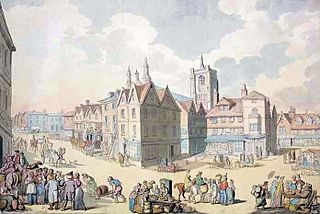Related Research Articles
Baron Mancroft, of Mancroft in the City of Norwich, is a title in the Peerage of the United Kingdom. It was created in 1937 for the Conservative politician Sir Arthur Samuel, 1st Baronet. He had already been created a Baronet, of Mancroft in the City of Norwich in the County of Norfolk, in 1932. His son, the second Baron, was also a Conservative politician. In 1925 he assumed by deed poll the surname of Mancroft. As of 2010 the titles are held by the latter's only son, the third Baron, who succeeded in 1987. He is one of the ninety elected hereditary peers that remain in the House of Lords after the passing of the House of Lords Act of 1999. Lord Mancroft sits on the Conservative benches.

Norwich South is a constituency in Norfolk represented in the House of Commons of the Parliament of the United Kingdom, since 2015 by Clive Lewis, of the Labour Party.

Peter Collins was an English pipe organ builder based in Melton Mowbray, Leicestershire. He specialised in tracker action organs. Collins was an advocate of computer-aided design, using it to produce compact instruments and to control material costs.

St Peter Mancroft is a parish church in the Church of England, in the centre of Norwich, Norfolk. After the two cathedrals, it is the largest church in Norwich and was built between 1430 and 1455. It stands on a slightly elevated position, next to the market place.

Arthur Michael Samuel, 1st Baron Mancroft was a British Conservative politician.

The Norman-era Minster Church of St Nicholas in Great Yarmouth remains, due to its floor-surface area, England's third largest parish church, behind Beverley Minster in East Yorkshire and Christchurch Priory in Dorset. It was founded in 1101 by Herbert de Losinga, the first Bishop of Norwich, and consecrated in 1119. Since its construction, it has been Great Yarmouth's parish church. It is cruciform, with a central tower, which may preserve a part of the original structure. Gradual alterations effectively changed the form of the building. Its nave is 26 feet (7.9 m) wide, and the church's total length is 236 feet (72 m).
Frederick Gunton (1813–1888) was an English organist.
John Charles Beckwith was an English Organist, born in Norwich.
John Christmas Beckwith was an English organist and composer.
Charles Holloway James,, (1893–1953), architect, specialised in designs for homes and housing projects, but also completed large public works, particularly in collaboration with Stephen Rowland Pierce.

Charles Catton RA, sometimes referred to as Charles Catton the elder, was a notable English coach painter, landscape, animal and figure painter of the late 18th century, and one of the founder members of the Royal Academy of Arts.

Sir Peter Gleane (1564–1633) was an English politician who sat in the House of Commons from 1628 to 1629.
Henry Stonex was a composer and organist based in Great Yarmouth.
Richard John Maddern-Williams FRCO was a music teacher and organist based in Norwich.
Edward Dearle was an organist and composer based in England.
Robert James Potter was an English architect who was noted for his work on church buildings. Born in Guildford, he studied architecture in London before moving to Salisbury where he established his practice.
William Richard Bexfield was an English composer. He is known particularly for his oratorio Israel Restored, first performed two years before his early death.
William Pelham-Burn (1859–1901) was Archdeacon of Norfolk from 1900 until his death.
John Berney was Archdeacon of Norwich from 11 October 1744 until his death on 13 June 1782.